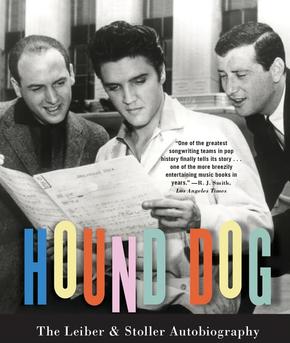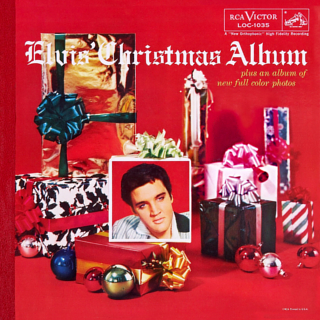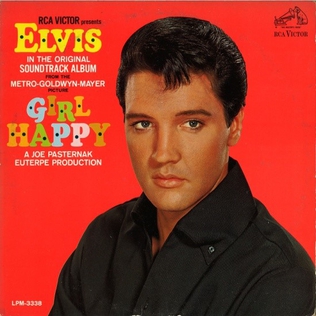Peter Guralnick is an American music critic, author, and screenwriter. He specializes in the history of early rock and roll and has written books on Elvis Presley, Sam Phillips, and Sam Cooke.

Jailhouse Rock is a 1957 American musical drama film directed by Richard Thorpe and starring Elvis Presley, Judy Tyler, Mickey Shaughnessy, Vaughn Taylor and Jennifer Holden. Adapted by Guy Trosper from a story written by Nedrick Young, the film tells the story of Vince Everett (Presley), a convict who learns the guitar while in prison and later becomes a star following his release.

Leiber and Stoller were an American Grammy award-winning songwriting and record production duo, consisting of lyricist Jerry Leiber and composer Mike Stoller. As well as many R&B and pop hits, they wrote numerous standards for Broadway.

An Elvis impersonator is an entertainer who impersonates or copies the look and sound of American musician and singer Elvis Presley. Professional Elvis impersonators, commonly known as Elvis tribute artists (ETAs), work all over the world as entertainers, and such tribute acts remain in great demand due to the unique iconic status of Elvis. In addition, there are several radio stations that exclusively feature Elvis impersonator material. Some of these impersonators go to Graceland on the anniversary of Presley's death to make their personal tribute to the artist.

The Sun Sessions is a compilation album by American singer Elvis Presley, issued by RCA Records in 1976. The album contains Presley's earliest commercial recordings, made in Memphis, Tennessee for Sun Records in 1954 and 1955. RCA issued the album in the UK in 1975 under the title The Sun Collection. The album features liner notes by Roy Carr of the New Musical Express. The Sun Sessions features most of the tracks Elvis recorded for Sun Records and produced by Sam Phillips, the head of Sun Studios. The Sun Sessions reached number two on the Billboard Country Albums and number 1 on the Cashbox Country Albums charts.

"Jailhouse Rock" is a rock and roll song recorded by American singer Elvis Presley for the film of the same name. It was written by Jerry Leiber and Mike Stoller. RCA Victor released the song on a 45 rpm single on September 24, 1957, as the first single from the film's soundtrack EP. It reached the top of the charts in the U.S. and the top 10 in several other countries. The song has been recognized by the Grammy Hall of Fame, the American Film Institute, and others.

Chris Cutler is an English percussionist, composer, lyricist and music theorist. Best known for his work with English avant-rock group Henry Cow, Cutler was also a member and drummer of other bands, including Art Bears, News from Babel, Pere Ubu and (briefly) Gong/Mothergong. He has collaborated with many musicians and groups, including Fred Frith, Lindsay Cooper, Zeena Parkins, Peter Blegvad, Telectu and The Residents, and has appeared on over 100 recordings. Cutler's career spans over four decades and he still performs actively throughout the world.

"Kentucky Rain" is a 1970 song written by Eddie Rabbitt and Dick Heard and recorded by Elvis Presley. It was recorded at American Sound Studio and features then session pianist Ronnie Milsap. Other musicians on the record include Bobby Wood on piano, Bobby Emmons on organ, Reggie Young on guitar, Tommy Cogbill on bass and Gene Chrisman on drums. The song and session was produced by Felton Jarvis and Chips Moman. It was certified Gold by the RIAA, signifying United States sales of more than a million copies.

Greatest Hits is Phil Ochs' seventh album and final studio album released in his lifetime, released in 1970 on A&M Records. Contrary to its title, it offered ten new tracks of material, mostly produced by Van Dyke Parks.

Mojo is a popular music magazine published monthly in the United Kingdom, initially by Emap, and since January 2008 by Bauer. Following the success of the magazine Q, publishers Emap were looking for a title that would cater for the burgeoning interest in classic rock music. The magazine was designed to appeal to the 30 to 45-plus age group, or the baby boomer generation. Mojo was first published on 15 October 1993. In keeping with its classic rock aesthetic, the first issue had Bob Dylan and John Lennon as its first cover stars. Noted for its in-depth coverage of both popular and cult acts, it acted as the inspiration for Blender and Uncut. Many noted music critics have written for it, including Charles Shaar Murray, Greil Marcus, Nick Kent, David Fricke, Jon Savage and Mick Wall. The launch editor of Mojo was Paul Du Noyer and his successors have included Mat Snow, Paul Trynka, Pat Gilbert and Phil Alexander. The current editor is John Mulvey.
Simon Goddard is a British author and music journalist.

The Taqwacores is the debut novel by Michael Muhammad Knight, depicting a fictitious Islamic punk rock scene. The title is a portmanteau of taqwa, an Islamic concept of love and fear for God, and Hardcore, the punk rock subgenre. Some of the most popular taqwacore bands are The Kominas, Al-Thawra, Secret Trial Five, and Fedayeen.
Gail Brewer-Giorgio is an American author whose works have speculated about the possibility that singer Elvis Presley may have faked his death in August 1977.

Elvis' Christmas Album is the third studio album and first Christmas album by American singer and musician Elvis Presley on RCA Victor, LOC -1035, a deluxe limited edition, released October 15, 1957, and recorded at Radio Recorders in Hollywood. It has been reissued in numerous different formats since its first release. It spent four weeks at No. 1 on the Billboard Top Pop Albums chart, and was the first of two Christmas-themed albums Presley would record, the other being Elvis Sings the Wonderful World of Christmas, released in 1971. The publication Music Vendor listed Elvis' Christmas Album on their singles charts for two weeks in December 1957 – January 1958, with a peak position of No. 49.

Elvis Is Back! is the fourth studio album by American singer Elvis Presley, released on April 8, 1960 by RCA Victor. It was Presley's first album of new material since 1958's King Creole soundtrack, as well as his first to be recorded and released in stereophonic sound. The album marked Presley's return to music after his discharge from the U.S. Army.

Since the beginning of his career, American singer Elvis Presley has had an extensive cultural impact. According to Rolling Stone, "It was Elvis who made rock 'n' roll the international language of pop." The Rolling Stone Encyclopedia of Rock & Roll describes Presley as "an American music giant of the 20th century who single-handedly changed the course of music and culture in the mid-1950s". His recordings, dance moves, attitude and clothing came to be seen as embodiments of rock and roll. His music was heavily influenced by African-American blues, Christian gospel, and Southern country. In a list of the greatest English language singers, as compiled by Q magazine, Presley was ranked first, and second in the list of greatest singers of the 20th century by BBC Radio. Some people claim that Presley created a whole new style of music: "It wasn't black, wasn't white, wasn't pop or wasn't country—it was different." As most singers in his time created music geared for adults, he gave teens music to grow up with.

"I Got Stung" is a 1958 song recorded by Elvis Presley and released as a single written by Aaron Schroeder and David Hill and published by Elvis Presley's company Gladys Music, Inc. It was a number one hit in the UK in 1959 and again in 2005 as a double A-side single.

"You'll Be Gone" is a song recorded by Elvis Presley and published by Elvis Presley Music and released in 1965 on the Girl Happy soundtrack album and as a 45 single. The song was recorded in 1962 and was one of very few which Presley was involved in writing; his co-writers were his bodyguard Red West and Charlie Hodge. The other song that Elvis Presley composed was "That's Someone You Never Forget" in 1961 with Red West, which was on the Pot Luck LP released in 1962. The song was recorded on Sunday, March 18, 1962, at RCA Studio B in Nashville, Tennessee.

Girl Happy is the tenth soundtrack album by American singer and musician Elvis Presley, released on RCA Victor Records in mono and stereo, LPM/LSP 3338, in March 1965 – the March 1 date is disputed. It is the soundtrack to the 1965 film of the same name starring Presley. Recording sessions took place at Radio Recorders in Hollywood, California, on June 10, 11, 12, and vocal overdubs by Presley on June 15, 1964. It peaked at number eight on the Top LP's chart. It was certified Gold on July 15, 1999 by the Recording Industry Association of America.

Frankie and Johnny is the twelfth soundtrack album by American singer and musician Elvis Presley, released on RCA Victor Records in mono and stereo, LPM/LSP 3553, in April 1966. An excursion into Dixieland and ragtime music, it is the soundtrack to the 1966 film of the same name starring Presley. Recording sessions took place at Radio Recorders in Hollywood, California, on May 12, 13, and 14, 1965. It peaked at number 20 on the Top LP's chart. It was certified Gold and Platinum on January 6, 2004, by the Recording Industry Association of America.

















